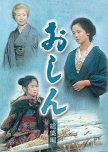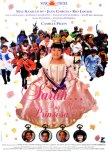
This review may contain spoilers
A place to go back home to
"Dondo Hare" is the seventh asadora that I've completed. I first chose it at random since it was one of several asadoras I currently have downloaded on my computer. I was also curious about watching a "modern" asadora (i.e. one taking place around the year it aired). I then noticed that the lead actress appears in "Natsuzora," which is the 100th asadora and references older asadoras. That's when I really committed to watching it (I'll be watching "Dandan," "Chiritotechin," and "Manpuku" next for the same reasons). "Dondo Hare" was a surprisingly easy watch, excepting a couple of the storylines. I was really able to just breeze through it.The drama follows Natsumi (played by Higa Manami) as she trains to become a proprietress for a traditional Japanese inn, called Kagamiya, which her fiancé Masaki (Uchida Asahi) decides to take over. Masaki's aunt Tamaki (Miyamoto Nobuko) is the current proprietress and wants her son Shinichi (Azuma Mikihisa) to take over. However, the head proprietress Katsuno (Kusabue Mitsuko) wants Masaki instead. This family conflict pushes the plot forward for the majority of the drama.
The first two weeks of "Dondo Hare" set up the drama well. I really liked the weeks that follow since it had a slice of life vibe as every week had different guest for Natsumi to help. The tone shifts, however, when Natsumi's meddling causes her to quit her training. Of course, she goes back but the tone returns to what it was. From then, there seems to be a series of neverending problems for Natsumi or the inn. At one point, the poor girl has two "rivals" to contend with. The drama's best feature is its sense of family and I wish it had focused on that instead of just throwing one problem after another at them.
Natsumi is a good heroine and her characterization helps the drama when the writing gets weaker. Her naivete may be a tad annoying at sometimes, but (like the drama says) her ability to "believe" in people is also her strong point. She seems like the typical hard-working, bright smile heroine at first. Natsumi, however, is not just that and shows a wide-range of genuine emotion. Her and Masaki's relationship could've been stronger. Since they were engaged before the story starts, it feels that the writers phoned them in just a bit. Instead Natsumi's relationships with Katsuno and Tamaki are much more interesting and nuanced. I also just want to add that I liked all of the supporting characters. Everyone at the inn felt like a family.
Now in conclusion, I recommend "Dondo Hare." It's not the best asadora, of course. But it's a fun, easy watch. I got tired of the constant troubles, but Natsumi makes these times easier to get through. The final week of episodes could've had more happiness, instead of hastily trying to wrap up the final conflict. The very final episode, however, was worth it. I definitely cried T_T At the end, I felt just as attached to Kagamiya as all of the characters. It felt like (as the drama says) a place to go home to.
Was this review helpful to you?

This review may contain spoilers
Meh.
After finishing the first season, I entered into the second season with trepidation. The beginning starts off kind of rough. We are now minus two cast members. Rhys Miguel as Tob was possibly fired or didn't want to continue the loveteam with Kaori Oinuma (Michiko). Melizza Jimenez as Elle decided to focus on school instead of acting and was recast with Mikha Lim. Tob's disappearance is integrated into the plot as him "ghosting" Michiko. Despite the rough start, I really liked the first few episodes of the season. However, it started to go downhill towards the mid-point when the plot starts to focus only on the whole criminal investigation surrounding Dale being shot. I won't go into this because I could go on and on, but I hated it. It doesn't really pick back up after that, unfortunately.The leads, Donny Pangilinan (Deib) and Belle Mariano (Max), have great chemistry. They honestly save this mediocre second season. Without them I would've been so much worse. The plot does give them some great chances to flex their acting chops, but it's unfortunate that it never seems to go anywhere. The supporting cast feels weaker in this season besides maybe Michiko (played by Kaori Oinuma). They really threw everything at her. RJ and Kim just feel like they're as plot devices. They might've had something interesting with Lee, Naih, and Ysay, but the writers back out of it at the last second. Poor Migz, Elle, and Lorde are just there. And the adult drama between Max's dad, stepmom, and the new principal was kind of random but I would've preferred them focus on that instead of the stupid investigation.
The last couple episodes come out of nowhere. All of the sudden, Dale is just dead? WTH. I don't understand why he didn't die during surgery?? He died while sleeping?? He was in a hospital; he would've been hooked up to something. Okay, I did cry but how he died was so stupid. Then it's the last episode so they have to wrap up everything, but they don't do it very well. It's frustrating. Anyway, despite my complaints, I mostly enjoyed the series. I don't regret finishing it. I just wish it had matched the first season in terms of entertainment.
Was this review helpful to you?

This review may contain spoilers
"A mother's worries are never over."
"Oshin" is the sixth asadora that I've watched. Like "Ohisama" and "Hanako to Anne," it has been on my radar for a long time. It's considered a classic after all. But, like most people, I thought the 297 episode count was daunting. However, after I decided to go all in with asadora dramas, I knew I wanted to watch "Oshin" early on in this journey. How I approached "Oshin" was that I watched in sets of 2 to 3 weeks at time and then switched to watching "Ohisama" for 2 to 3 weeks. I obviously finished "Ohisama" first with this method. I think this helped "Oshin" feel less daunting at times and helped keep my interest up, instead of giving me burn-out.The structure of "Oshin"'s story is similar to "Ohisama," being presented as older Oshin (Nobuko Otowa) telling her life story to her grandson Kei (Goro Ohashi). There is an extra layer of mystery as we as an audience are unaware of why she has suddenly left home for her nostalgia trip. The reason is not actually revealed until the final two weeks of episodes.
The first few weeks of "Oshin" covers Oshin's tough childhood during the Meiji period. She is played by an unforgettable young actress Ayako Kobayashi. Many of the lessons she learns during her childhood will be brought up continuously throughout the rest to the drama. Personally, these episodes are kind-of hard to watch. Oshin is the daughter of a sharecropper and sent out to work at only seven-years-old. After several bumps in the road, she finds employment at Kaga-ya. Here we finally meet some supportive adults and Oshin makes a lifelong friend in Kayo (Terumi Azuma). The story then skips to when Oshin (now played by Yuko Tanaka) is sixteen and meets her first love Kota (Tsunehiko Watase), an advocate for the farm labor movement who is constantly hounded by the police. These are the three most important characters of the story.
It will take too long to summarize the rest of the story so I'll just talk about some of the characters. Oshin's husband, Ryuzo (Shiro Namiki), is one of the most frustrating characters I've encountered in fiction. But this series has a lot of similarly frustrating characters: Oshin's father, her son Hitoshi, her mother-in-law Kiyo, her daughter-in-law Michiko, her brother Shoji, and her sister-in-law Tora. The writer, however, does something really interesting with all of these characters. She makes you dislike them so much that you're just wishing that they worse will befall them, but then she'll find a way for you to sympathize with them. These characters also make it easy to appreciate the nice people like the people of Kaga-ya, Oshin's hairdressing teacher, the yakuza member Ken, Ryuzo's servant Geneimon, and Kota's aunt Hisa. I love all of these people.
A little less than half-way through the drama, Oshin was at her in-laws in Saga. This storyline went on for a long time and is hands down the hardest part to get through. I took several breaks during this time and I recommend doing the same. This part sets a lot of context for when Oshin herself becomes a mother-in-law and adds a great bit of irony.
The latter half of the drama (when Oshin is played by Nobuko Otowa) is probably my favorite. I was finally able to relax and just watch Oshin set up her supermarket business. Her son Hitoshi was admittedly annoying, but he's surprisingly layered as a character. Her other children were great for the most part. I will say that the constant changing of actors as these characters aged was a bit confusing. They should've stuck with the old age make-up and grey hair. Kota's actor is never changed by the way; he just gets a mustache that turns greyer with time lol.
I had a great time watching this, even with all of the hard-to-watch parts. Asadora dramas are a truly a unique viewing experience. I've never quite felt like I knew characters so well. The story starts when Oshin is seven and then ends when she is 83 with very few time skips. An amazing epic drama. I see why it's considered a classic, especially within the context of the 1980s. For modern viewers, I encourage to exercise caution unless you're interested in different cultures and time periods. This is not like asadora dramas of today and may have a lot of things you don't like. Compared to something like "Hanako to Anne" (same time period), "Oshin" is a harsh watch.
Was this review helpful to you?

This review may contain spoilers
"All women are like the sun."
"Ohisama" is the fifth asadora that I have completed. The drama has been on my radar for a long time since it stars Mao Inoue, whom I love from the "Hana Yori Dango" series. However, I was always scared of the length of asadora series. Thankfully, I have gotten over that and quickly put "Ohisama" on my plan to watch list. I was actually surprised by how much I liked "Ohisama." It even rose to become my favorite asadora, beating out my beloved "Hanako to Anne" by a slight margin.The drama uses an interesting framing device similar to "Oshin" (which I was watching concurrently). It opens with a modern-day (2011) housewife, Fusako (Yuki Saito), meeting an elderly woman, Yoko (Ayako Wakao), who asks if she wants to hear her story. The story then frequently returns to present-day Yoko and Fusako as the drama unfolds. Ayako Wakao also provides the narration. I think both devices combined enhanced the story-telling experience, especially for a drama set during World War II. Subtle hints of the fate of characters were given either through the narration or a mention/appearance in the modern day. This helped keep the sometimes sad tone of the series down in my opinion.
Yoko's story starts in 1932 when her family moves to Azumino, a village in Nagano Prefecture. Her mother, Hiroko (Tomoyo Harada; whom I loved in "Hanbun Aoi") has long been sick and has chosen this place to die essentially. [Only the first week and I'm sobbing.] Yoko losing her mother at the young age of ten shapes the entire rest of the story, even to the final seconds. Her mother gives her advice to be "like the sun" (her name uses the character for the word for sun). Yoko from on frequently tries to be the sun for those around her. Older Yoko uses the quote "All women are like the sun" to Fusako much later in the drama and I just thought was such a beautiful thought.
The story then shifts to Yoko's high school days with her best friends, Machiko (Maiko) and Ikuko (Hikari Mitsushima). These two are some of the most important people in her life besides her father, elder brothers, and later on her husband, daughter, and in-laws. Yoko becomes a teacher after graduating (This will be her main ambition for the majority of the series). Unfortunately, it is now 1941, the year Japan bombed Pearl Harbor. If you're familiar with the Japanese retelling of the war, you'll see the typical "Japan cannot lose" rhetoric the common people were fed at the time. Yoko, unlike in the previous asadoras I've seen ("Hanako to Anne" and "Junjo Kirari"), is not even slightly politically inclined one way or the other. She is a little bit disturbed by teaching the children military tactics, but does as she is ordered essentially. Perhaps paradoxically, I found the war easier to watch because of this. I would've been harder to watch Yoko fighting against the tide, really. Yoko represents the common people whom were simply there.
Now addressing Yoko's husband, Kazunari (Kengo Kora). Their relationship is probably my favorite of the asadoras I've seen so far. These two are so sweet together and seeing them smiling at each other makes me want to smile. Their relationship starts from an "omiai" (arranged marriage meeting), but they feel totally natural with each other. The chemistry was so good. After he comes back from the war, I loved seeing them grow and learn together. Even up to the next to last week, they are becoming better at communicating with each other. I love to see such a healthy relationship in drama land. The way they tease each other is so cute too.
"Ohisama" has a lot of great supporting characters. I honestly loved them all and I can't even single one of them out because then I'll just start listing them all. Yoko's best friends are obvious contenders. The writers kept their lives consistently surprising. I wish Hikari Mitsushima had been given her own asadora; she was so good as Ikuko. Yoko's mother and father-in-law are like real parents to her and I love their constant banter. Likewise, Yoko's banter with her brother Shigeki (Kento Nagayama) never falls to entertain. His relationship with Ikuko was a surprise, but in hindsight, I should've seen it coming. They're perfect for each other. Then there's Yoko's father, brother Haruki, grandmother, Natsuko-sensei, Kayo-san and her husband, and all of her wonderful students. Haha I did just end up listing them lol. On a side note, "Ohisama" also features two future asadora heroines Tao Tsuchiya ("Mare"; also supporting in "Hanako to Anne") and Sakura Ando ("Manpuku").
The ending of "Ohisama" was bittersweet but not because anyone died. It's because I didn't want it to end. I've loved plenty of shows and books before, but there's very few I wish could go on forever. This one I would pick to watch on-and-on until the end of time. The finale, however, was still perfect so if it had to end, I'm happy it ended this way.
Was this review helpful to you?

This review may contain spoilers
Perfect for LizQuen fans
"Forevermore" officially launched the LizQuen ship after previous hints in the films, "Must Be... Love" and "She's the One" (I recommend them both btw). I'm going to start by summarizing the series first. Liza Soberano stars as Agnes, the daughter of a farmer, and Enrique Gil stars as Xander, the rich son of a hotelier who seemingly only cares about himself. Agnes lives on a farm, called La Presa, with a large group of people who are like a family. One day, Xander accidentally ruins Agnes's strawberries. The La Presans are desperate for cash to pay their rent and thus decide to hold Xander hostage until he repays them. He stubbornly refuses to pay them or reveal his name. Eventually, he causes so much trouble for them that Agnes just tells him to go. Agnes and her father, Buboy (Joey Marquez), later learn that Xander is the son of the president of the nearby Grande Hotel. They appeal to his father, Alex (Zoren Legaspi), who refuses to pay for his son. He instead agrees to lend Xander the money if he goes to work at Le Presa.Xander is reluctant at first, but does decide to go to Le Presa. There he has a hard time fitting in with the others who understandably don't find him very reliable. Agnes, in particular, finds him distrustful. He finds an ally in Mang Bangky (Bangkay), an old bachelor who relates to Xander's rebelliousness. Thanks to Bangky, he tries harder to win over the others though he inevitably makes many mistakes, which drives wedges into his budding friendship with Agnes. One such mistake is accidentally losing Niknok (Jesse James Ongteco), a young child who lives with his aunt Mirasol (Irma Adlawan) in La Presa. Running through the forest, Xander is reminded of the tragic death of his little brother Basty, which is shown through flashbacks. Once Niknok is found, Agnes yells hurtful words at Xander who then disappears. Agnes and Buboy go to Grande to find Xander. They meet Meg (Beverly Salviejo), his grandmother's assistant, who reveals Basty's death and that Xander's mother always blamed him. Xander eventually returns to La Presa and Agnes apologizes, starting a new chapter in their relationship.
Later, Xander realizes that he has feelings for Agnes, but is reluctant to give in to them, even telling her as much. His parents bring him back to Grande to integrate him into management now that he has become more responsible. His mother, Bettina (Lilet), resents Xander's new connection to La Presa, which becomes a frequent issue. After an earthquake hits, Xander saves Agnes from a falling down building. He confesses his feelings for her and receives permission from her father to court her. Agnes holds off on giving Xander an answer for a while, but eventually says yes to being his girlfriend. She also has to turn down her childhood friend, Andrew (Yves Flores) around the same time. Meanwhile, Bettina is working on opening an agricultural resort, hoping to earn the approval of Alex's mother Soledad (Marissa Delgado), whom has always preferred his son's first (and still legal) wife. Bettina works out a deal with Jaime and Loulie Saavedra (Michael Flores and Bernadette Allyson-Estrada), the parents of Xander's ex-girlfriend Kate (Sofia Andres).
Bettina invites Kate to the Grandes' annual Christmas party, hoping to reunite her and Xander. Of course, he is now dating Agnes. Kate seems to take this in stride and even sort-of befriends Agnes. Bettina pushes for Xander and Kate to be together, but begins acting friendlier with Agnes when she realizes that that isn't working. She invites Agnes to come work at the hotel, which will also earn her a scholarship for college. However, it goes terribly array. Xander decides to leave his family to live with the La Presans again. Meanwhile, Kate starts to sink into a depression and acts erratically. Her behavior obviously worries her parents. She lamely attempts to win Xander back. However, at the slightest pushback from Agnes and the La Presans, she encourages her father Jaime to make war on them. He attempts to seize La Presa through illegal means (having already being tasked with getting the land for the Grandes' resort). After Buboy is shot, Xander becomes overwhelmed and gives into Jaime's demands that he accompanies Kate to London. He leaves without a word, which devastates Agnes.
Two years later, Agnes, the twins Clauie and Judy (Joj and Jai Agpangan), and their new friend Karen (Karen Dematera) are attending college for a semester in Manilla. The La Presans come for a visit since Buboy and Mirasol have now decided to marry. Buboy needs to obtain an annulment since he is technically still married to his wife though he and Agnes haven't seen her for over a decade. Of course, it turns out that Marites (Almira Muhlach) is now living in Manila. Buboy confronts her and she confesses that her employer was holding her captive in Japan. Marites and Agnes are reunited after some time and Agnes allows her back into her life. Meanwhile, Agnes meets Jay (Diego Loyzaga) at school and joins his band. He gradually develops feelings for Agnes, though she seems reluctant to allow him to court her. Marites distrusts him him at first, but he wins her over when he comes to her with problems regarding his mother, who is currently working in Japan.
In the meantime, Xander has returned from London with Kate who has gotten better though still appears fragile. She eventually goes to the States after her father's shady business dealings are made public. Xander now has a successful business and loyal assistant, Orly (Jason Francisco). Orly helps Xander with his elaborate plan to win back Agnes. The plan goes up in flames as Agnes isn't even willing to hear him out. He decides not to give up yet and takes a temporary teacher's position at Agnes's college. Of course, she doesn't take this well and treats him coldly, such as only calling him "Sir." He acts respectfully towards her and, after attending a leadership workshop, the two are finally on friendly terms. The twins take sides with Clauie wanting her to reunite with Xander ("Superman") and Judy wanting her to be with Jay ("Batman"). Karen stays more neutral, though she realizes that Agnes still truly loves Xander. Agnes is seemingly ready to accept her feelings and agrees to have dinner with Xander and his family (FYI, the Grandes have since become better, more supportive family). However, when she glimpses Kate from outside, the emotions come rushing back.
Kate later finally explains to Agnes why Xander left her two years previously. Unfortunately, Agnes has now become numb to emotion, giving into fear rather than love. Xander takes this as a final rejection. He becomes depressed and his father encourages him to look at this as just a chapter in his life. Then on his way home, Alex is hit by a car and passes away. Xander, though still devastated, listens to his mother and grandmother's advice and becomes the new president of Grande Hotel. Meanwhile, Agnes and the twins return to La Presa; they are soon joined by Jay and Karen. Xander too finds himself in the area. His father's legal wife Sheree (Pinky Amador) and her brother Julius (Kit Thompson) are scheming once again. He later meets a local veterinarian Alex Pante (Erich Gonzales) and starts dating her. After his father's will is read, Xander decides to work on the agricultural resort again when the land is willed to his mother.
Xander attempts to buy La Presa, earning strong pushback from the people who once treated him as their own. Agnes meets with Xander who now treats her coldly. Her appeals don't work. However, his mother tells him that Alex likely left them to land not to complete the resort but to protect La Presa forever. Xander, realizing that this is the truth, reconciles with the La Presans and instead works out a new deal with them for a series interconnected cottages. Of course, Sheree and Julius attempt to sabotage the project by targeting the area's water supply. While searching, Xander and Agnes become lost in the forest. They spend the night holding each other. Later, Xander has Sheree and Julius arrested and ousted from the company. He ends things with his new girlfriend who has already realized that he still loves Agnes. Agnes decides to take a scholarship for a college in Japan and leaves La Presa. Xander catches up with her. They decide to start a new (albeit long distance) "forever" from then on.
Yes, that's a long summary, but it's a long show. Probably could've been cut down 10-15 episodes in my opinion. The first half of the show (e.g. before Xander leaves) is the stronger half, especially regarding the main couple. However, it does have Kate so it's not perfect The second half starts off well. It's reasonable that Agnes would act that way tbh and Jay is an enjoyable enough rival to Xander. I would argue that do they have to make Jay's life so miserable lol. Agnes's unwillingness to hear out Xander just lasts way too long. The writers could've condensed it a little. It feels like they had a hit on their hands and were just trying to extend the couple finally reuniting.
So, to conclude, I enjoyed this show for what it was. I was pretty easy to watch, despite it's length. Filipinos speak "Taglish," a mix of English and Tagalog, so I didn't have to pay 100% attention. I watched 2-5 episodes a night before going to sleep and I was able to finish it in little a month. It was a great comfort show. I recommend to LizQuen fans, but if you're unfamiliar with the loveteam or Filipino shows in general, I recommend watching Filipino films first.
Was this review helpful to you?

Kind-of boring
Every once in a while I come across a "classic" that I just can't bring myself to like. "In the Realm of the Senses" comes to mind since it's also a classic Japanese film. However, while that one made me very uncomfortable, "Woman in the Dunes" just kinda bored me. I can appreciate the story, the acting, the message, etc. But, at the end of the day, it put me to sleep literally."Woman in the Dunes" follows Niki Junpei (played by Okada Eiji), a substitute teacher and bug enthusiast, who comes to a remote village surrounded by sand. The villagers trap Junpei with a recently widowed woman (Kishida Kyoko). Every night, the woman shovels sand and the villagers take it away. Junpei tries in vain to escape the sand pit throughout the movie. An obvious allegory to Sisyphus.
Like I said, I can appreciate this plot. I felt that it did its job as it made me feel anxious and claustrophobic. But still, I fell asleep and I practically couldn't wait for it to end. To conclude, I didn't like it but I see it's artistic merit.
Was this review helpful to you?

This review may contain spoilers
'Nice Play'
"Jun-chan no Ouen-ka" is my fourth asadora. I chose the drama since the fansubber had just finished subbing it. You can find the subtitles over at d-addicts by the way. "Jun-chan" was different from the previous asadoras I watched. The key difference being that Junko (played by Yamaguchi Tomoko) is an unambitious heroine. This is not bad, but it does mean that the series does not necessarily have a goal it's working towards. Junko instead focuses on taking care of her family through various ways. The drama therefore feels like more of a family/slice-of-life drama. I liked this kind-of easy-going pace, but I wasn't exactly on the edge of my seat after each episode to find out more.Besides family, "Jun-chan" has a secondary focus of baseball. It links to several of the series major characters and is also the source of the more emotional moments. I'm sure the third to the last episode will get you. Junko's brothers, Akira and Yuta, are the main ballplayers of the series. They are also two of my favorite characters. There is a slightly awkward transition from where they are played by child actors to adult actors. However, I thought the adults were stronger actors so that makes up for it. I particularly liked the adult Yuta (played by Karasawa Toshiaki).
The main storyline in "Jun-chan" is perhaps the romance between Junko and the Japanese-American, Shuhei (played by Takashima Masahiro). I thought these two had strong chemistry and they manage to stay interesting even after getting married. Much of the latter half of the drama is about them working through their marital and childrearing problems. Considering their strong, stubborn personalities, I liked that the writers didn't opt for a "happily ever after"-type marriage.
Now addressing Junko. She's a very low-key heroine in some ways. Junko gets most of her satisfaction out of life by helping others whether it's doing the housework or supporting her family by working at a diner and later an inn. However, she is not portrayed as being perfect. Junko has a bit of a martyr complex and is often stubborn. Her family and loved ones appreciate what she does, but aren't afraid to call her out every now and again. As a heroine, I found Junko very enjoyable to watch. I'll remember her for her bright and never-ending perseverance.
To close out, I chose to title this review "Nice Play" after a pivotal moment in the series. It's used in baseball to indicate "good game" basically. However, one character points out that this could apply to life itself. Junko, her family, and friends each had a "nice play." I enjoyed nearly every minute of the series and I liked that the ending indicates that their lives will go on after the story.
Was this review helpful to you?

Mostly fluffy romance
I've wanted to watch this this for a while since I saw some people comparing it to "Boys Over Flowers" (aka "Hana Yori Dango"). In hindsight, I think it's kind of a disservice to the drama though to call it a "BOF rip-off" just because it has a similar premise. I won't get into the plot because there's already plenty of reviews of "He's Into Her" on here. I'll just list what I liked and disliked about the series.Likes
1) The premise. I will never get tired of seeing a spunky girl stand up to a clique of rich boys lol. If you also enjoy this premise, this will be a fun drama for you.
2) Friendship. This isn't an ensemble drama but I really liked the large cast of friends of the FL and ML.
3) Romance. The romance here is surprisingly strong for a teen show. Donny (playing Deib) and Belle (playing Max) have really good chemistry and I see why they're a new "loveteam" now. The side couples aren't really that strong though.
4) Theme strong. I really top-notch, boyband theme song. I love it.
Dislikes
1) Rivals. RJ and Kim are the love rivals for the FL and ML. They are mentioned semi-frequently before they finally appear, but their real appearance still feels too late in the game. They end up feeling like unnecessary obstacles.
2) Fighting. Around the mid-point of the drama, the FL and ML's fighting felt really annoying.
3) Dropped and unfinished storylines. A love triangle between Ysay, Migz, and Hunter is set up but dropped. The series ends with a lot of unfinished storylines, such as Deib's brother. This is annoying as I would have preferred the story to be self-contained with the season.
"He's Into Her" is a fun, fluffy romance. The characters are well-written for what they are. Their motivations make sense and can apply to the real-world. Though it feels somewhat like a Wattpad story, I'm happy that they went that way instead of into soap opera territory. Now time to watch the sequel. Crossing my fingers that they don't ruin it lol.
Was this review helpful to you?

This review may contain spoilers
Half Blue
This is only my third asadora. I chose "Hanbun, Aoi" because I was looking for something a little lighter than the previous one I watched. It definitely delivers as the drama is full of comedic, light-hearted moments that I loved. If you've seen the "Reply" series, "Hanbun, Aoi" reminded me of it in several aspects. However, it is an asadora and has plenty of really emotional moments, especially as you get to the end.Out of the three asadora dramas I've seen thus far, "Hanbun, Aoi" has the weakest story. It starts off a little slow with the childhood and adolescence weeks, but it's easy enough to push through these and they are important in the long run. Suzume (played by Mei Nagano) is the series heroine. As a child, she loses the hearing in her left ear. This will continue to effect throughout the entire series. "Hanbun, Aoi" picks up when Suzume finds her passion. Becoming a manga artist. These weeks were no doubt my favorite and not only because I'm a manga fanatic. The world of manga, however, is sadly a tough one. Suzume manages to make her debut, but eventually decides that she can go no further. Whether Suzume should've given up or not is up for debate, but I really enjoyed how the storyline was handled.
Now the next half of "Hanbun, Aoi" was completely unrecognizable from the first. I have to say that I went through a bit of shock. I'm going to address Suzume's love interest now. Ritsu (played by Takeru Satoh) was born on the same day as Suzume and has always been on her side until they parted ways. When they reunite, he proposes to Suzume but she mistakenly says "I can't". He marries someone else a few years later. For me, this was very frustrating and only gets worse if we're being honest. On top of that, Takeru is very underutilized as Ritsu and he only gets character development sporadically.
Suzume, depressed by missing her chance to marry Ritsu and giving up her dream, starts working at a 100-yen store. There she meets Ryoji (played by Shotaro Mamiya) and they decide to marry after only knowing each other for a week. It's cute in a way, but they both come off as extremely naive in relationships. Suzume decides to support Ryoji in his dream of becoming a director, but he decides to give it up after failing and then Suzume getting pregnant. They are a happy family until Ryoji decides to abandon him to pursue his dream again. I don't know what's worse: Your husband leaving you for another woman or leaving because you're in the way of his dreams. Yikes. Suzume returns home and enter Ritsu.
The story becomes somewhat frustrating at this point. Suzume seems to just jump from one thing to another. I wish the writers had decided on a second dream for her and stuck with it. And worse, she and Ritsu are back in each other's lives but... Ritsu is still married and seemingly doesn't want to leave her, despite their obvious problems. I'm not advocating giving up on your marriage so easily, but this was just another excuse for the writers to delay the main couple again. Another time-skip. Suzume is back in Tokyo for her daughter to take skating lessons. She's failing at being a start-up businesswoman. Ritsu returns from America and is finally divorced (his wife left him!). Suzume and Ritsu partner together on a start-up. Finally, after completing their first project, they decide to be together.
"Hanbun, Aoi" has one of the most frustrating main couples I've seen in a long time. It's unfortunate because I really like them together and I just wish that we had seen more of them. However, this is by no means a bad drama because of that. Most of the characters are really strong, including Suzume (though her career choices are a bit bizarre). I love her family and her friends. She has absolutely beautiful relationships with her mother, daughter, and best friends. This is definitely the highlight of this drama. "Hanbun, Aoi" translates to "half blue." I think it means something like looking on the bright side. Though bad things will happen to you, there will always be good times.
Was this review helpful to you?

An easy but forgettable watch
I recently finished "Rich Man, Poor Woman" in order to watch this drama, but honestly the two dramas are so different... It's hard to even think of "Faceless Love" as a remake of RMPW if we're being honest.First, the story is fine. It's a really easy watch, so I was able to finish it within a couple days which is sometimes hard for me to do, personally. However, I also get the feeling that I will probably forget within a few months. Second, the actors all do a fine job as well but no one really stands out in my mind. Dew is a little wooden and Luke is overacting a tad during his angry scenes. They're both super good-looking though so I didn't really mind that much. Kao is a good actress but can't really rise above the kind-of meh script.
Now let's address the changes from the source material I liked and disliked as well as just some general likes and dislikes:
Likes: The series is more of a straight-up romance compared to the original, which desperately needed more romance scenes (Thank God for the follow-up movie); The motivations of Luke's character make more sense than in the original; The family scenes with the FL and later the ML's family were very heartwarming.
Dislikes: Dew's character isn't presented as a "genius like in the original, which makes him seem like just a spoiled brat. Like, why is even the CEO of the company in the first place; June's mean girl is entertaining but her motivations are weak; Kao's character doesn't become her own person like the original.
On a side note, I feel like this series misrepresents prosopagnosia (face blindness) and Alzheimer's (dementia) in some ways. However, since I'm not well versed in either illness, I will make no further comment. It just bothered me a bit.
If you like any of these actors, I would recommend the series. If you're a fan of the original drama, I probably would not recommend because it's too different.
Was this review helpful to you?

This review may contain spoilers
No Life Is Meaningless
At a glance, "Junjo Kirari" might seem like just another story about following your dreams. The story, however, grows along with our heroine Sakurako (played by the wonderful Aoi Miyazaki) as she discovers the meaning of life itself. For this reason, the drama starts off very light and fluffy which represents childhood and adolescence. As the Second World War looms, it quickly becomes about persevering through hardships. Then the post-war section is where Sakurako finds true happiness surrounded by her love ones.This is only my second asadora. The first being "Hanako to Anne." There are a lot of similarities between the two as both follow a heroine from a poor family living in a small town who goes to Tokyo to follow her dreams. And both also cover the war. I've knocked out a half a point from "Junjo Kirari" 's score because of some story elements I didn't really like. So let's cover those first.
1) I disliked Sakurako's engagement with Saito Sensei. I'm assuming that there's not much of an age difference, but still a grown man being interested in a seventeen-year-old will always give me the ick. I'd also like to point out that they have zero chemistry together. Thankfully, this storyline doesn't go on for long.
2) Fueko's character easily becomes one of the most inconsistent characters of the series, but I have mixed feelings about it. It might be natural for a woman to change after marriage and childbirth. I'm not really sure.
3) The war weeks were already going on too long, but they just had to have Sakurako fall in love with Togo (Fueko's husband). Nothing happens of course, but I still hate it.
Now these complaints are out of the way. "Junjo Kirari" has a lot of good points. The heroine is a lovely and fun person to follow as she follows her music dreams and sacrifices for her family. Sakurako is stubborn and strong-willed, but not in annoying way. There are some great supporting characters like Tatsuhiko (Sakurako's love interest), Togo (a wandering artist), Kane (Tatsuhiko's mother), Momoko (Sakurako's sister), and others. I will say I didn't feel as attached to the side characters in this series, but I think that's just because the focus is given more to Sakurako. The music is also nice in a calming sort of way.
My final comment is that though this drama has a tragic ending, I will not lower the score for that. Sometimes tragedy is called for at the end of a drama. That does not mean our time was wasted, just that sad things happen some time. I really liked this drama and had a nice time watching it.
Was this review helpful to you?

This review may contain spoilers
I swear they turned Sarah into Jesus....
I first came to know about this film around 2016/17 when I first read the novel "A Little Princess." Like other classics ("Pride and Prejudice," "Wuthering Heights," "Anne of Green Gables," etc.), I like watching all the different adaptations to see how the story can be interpreted differently. For "A Little Princess," I watched the 1917 silent film, the 1939 Shirley Temple movie, the 1985 anime, the 1986 British miniseries (the most faithful), the 1995 American film (my personal favorite), and the J-drama "Shokojo Seira" (interesting and I would recommend it). Yes, there's a lot. The Filipino version alluded me. I was unable to find anywhere, let alone with subtitles. Well, I finally found it but....Unfortunately, I feel like I set up this movie to fail. I had built it up in my mind over the last several years. I believe I would've had the same complaints, but it feels like I was let down personally... Anyway, with that out of the way, let's get on to the issues.
The movie is set in 1890 England with the school being a castle in the countryside instead of a modest home on the streets of London. It being a Filipino movie, this seems strange at first but you get used to it quickly. The first forty minutes is dedicated to Sarah's school life, which I feel takes too long and focuses too much on her schoolmates. Besides Sarah, the other child actors aren't very good and it's sometimes painful to watch. The movie picks up slightly with Sarah's fall from grace, but soon becomes crazy with the last twenty or so minutes.
My main issue with the movie is Miss Minchin. Not the acting, but the writing. She has no proper motivations for hating Sarah at all, which would be fine if she doesn't have a "redemption" at the end. I mean redemption very loosely because all she does is thank Sarah for not sending her to jail... And this is what I mean by them turning Sarah into Jesus. The movie has a distinct religious undertone. I believe Filipinos are very heavily Catholic so this makes sense. However, the religion becomes a problem at the end of the film. Sarah grants forgiveness to those who wronged her without anyone receiving punishment. It's fine to teach children to forgive like Jesus, but that should come hand-in-hand with justice (if possible).
The movie makes several other changes to the source material. It takes inspiration from the anime (which was very popular in the Philippines). If you've seen the anime, you'll be able to spot the references in the movie. These changes and other small cultural changes didn't bother me as adaptations need changes. To conclude, I mostly enjoyed this movie until the end. The ending just annoyed me too much!
Was this review helpful to you?

The Bend in the Road
I first heard about "Hanako to Anne" several years ago. As an avid "Anne of Green Gables" fan, I'm always keeping my eyes out for anything even remotely Anne-related. However, since it has 156 episodes, "Hanako to Anne" got pushed further and further down on my priority list. That is until last December when I discovered the book on which the series is based. It was published in English as "Anne's Cradle: The Life and Works of Hanako Muraoka." I highly recommend it if you're interested in knowing more about Hanako. After reading it, I finally sat down to watch "Hanako to Anne." Now my only regret is that I didn't watch it sooner!Watching an asadora is an experience like no other form of media I've experienced so far. The closest I can compare it to is a really long novel, which is likely why they're called 連続テレビ小説 ("serial TV novel"). If you're hesitating to watch any asadora, I recommend watching the first six episodes (i.e. the first week). Before I knew it, I was hooked and watching up 12-20 episodes a day.
The main character, Hanako, is my favorite character since I couldn't help feeling more attached to her after reading a whole book about her. She is somewhat upstaged by her best friend, Renko, who at times feels like her co-lead. The rest of the cast also gets the time to shine, which is what I think is the part of watching an asadora. By the end of the series, everyone feels like they could be your friend or family. Extensive character development is given to nearly every single person. It's amazing to watch it play out.
Anne references are sprinkled throughout the series, which are fun to see even if they're not exactly true to life. Many of the characters are based on real-life people Hanako knew, though their names have been changed along with some artistic license. I was surprised that the drama covered some very tragic moments in Hanako's life since it originally aired early in the morning. However, no punches were pulled so expect to be crying at some point.
Now to close out this review. I've given it a very generous rating of 10. Honestly, everything was great about it from the acting, the music, the writing, etc. I loved it every bit of it. Even when the story dragged a little bit, it's easy to forget since the episodes before and after the draggy part are so great. I'm so surprised no one has written a review for this amazing drama yet. I sincerely hope if you're reading this that you'll check it out!
ごきげんよう。さよなら。(Gokigenyo. Sayonara.)
Was this review helpful to you?

"Death is a sad thing."
"Why didn't I tell you a million times?" has a great cast who bring their best performances. The premise is familiar (and kind-of a retread of the movie "Ghost"). Despite that, I enjoyed the drama for the emotional performances of the cast of the mystery aspect of the main character's death. I will say that 10 episodes feels a bit too long. They could've shortened it to 6-8 episodes. I do appreciate that the mystery wraps up in the ninth episode and the final is dedicated to finishing up the character's storylines.I recommend the drama for those who like emotional stories and are ready to cry. It is a bit slow going so keep that in mind.
Was this review helpful to you?

A Bit Disappointing
While "Boys Over Flowers" will always be considered Yoko Kamio's signature work, I think "Cat Street" is her masterpiece. Strong words, but that's really how strong I feel about the series. Now it's not perfect and I could nitpick it, but we're here to nitpick the drama not the manga.First, "Cat Street" is entirely too short at 6 episodes. If they only would've increased it to 10 or 11 episodes, I think they could've told a story closer to the original "Cat Street." They could've included Rei instead of mashing him with Koichi (which totally doesn't work), but maybe not make him a love interest for Keito to allow for time. And there would've been more time for the main couple to develop. Their relationship (though expected by me) felt like it came out of nowhere.
The cast was at least well casted. Mitsuki Tanimura and Tomoka Kurokawa have a great dynamic and portray their characters well. I only wish that Mitsuki's hair and clothing had been styled better. Ryo Kimura as a new character Gota was cute. Ryo Katsuji as Koichi fits the part physically but the writing kind of ruins him. Taiyo's (Hideo Ishiguro) arc with Keito is cut short and is not as satisfying. And also, I liked that the headmaster and Keito's parents are shown more than in the manga.
My final complaint is that they included the worst, most ridiculous arc of the manga, in which Keito gets kidnapped. However, here they make the perpetrator Nako (Ai Takabe) instead of the admittedly more random character in the manga. In the process, it ruins Nako's and Masanobu's (Kei Tanaka) characters. It just completely rubs me the wrong way.
I don't picture "Cat Street" getting another adaptation (all of the love goes to "Boys Over Flowers"), but I hope it gets a proper adaptation someday.
Was this review helpful to you?























